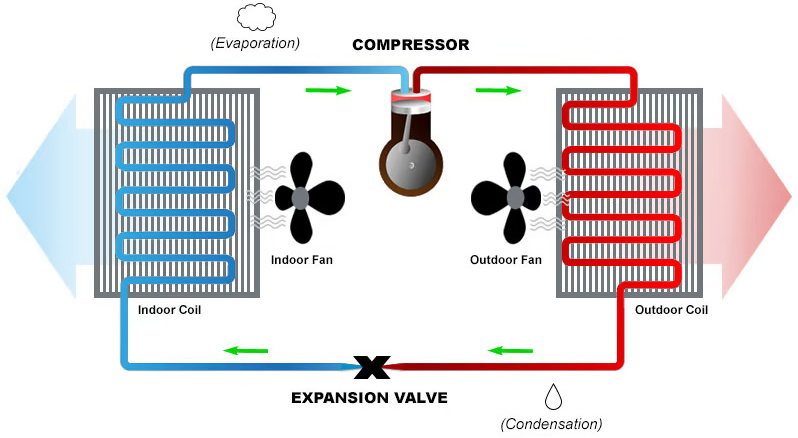So what is a heat pump?
A heat pump is part of your home’s heating and cooling system and is installed outside your home, taking the place of your air conditioner. Despite the name, heat pumps do not generate heat – they transfer heat from one place to another using refrigerant. When in cooling mode, a heat pump and an air conditioner operate the same way, by absorbing heat from inside your home and releasing it at the outdoor unit. This process of rejecting heat outside is what dehumidifies and cools your home off.
Now this is the exciting part - Heat pumps can also reverse the flow of refrigerant and have a heating mode, where air conditioners do not. When in heating mode a heat pump absorbs heat energy from the outside air (even in cold temperatures) and transfers it to the indoor air. By comparison, a furnace creates heat by burning natural gas/LP. Burning fuel for heat vs transferring heat makes heat pumps a more efficient way to heat your home, while also being friendly to the environment and your wallet. Speaking of your wallet, some of the rebates on heat pumps will blow you away, typically returning thousands of dollars to you following the install. Call us today at 608-782-4035 to learn more about heat pump and their rebates.
How do they work in our colder climate?
While heat pumps are a more efficient means of heating your home, as the temperatures outside drop, their efficiency does as well. This is simply because there is less and less heat to absorb the colder it gets outside. Therefore we partner your heat pump install with an auxiliary heating source, typically a gas furnace, electric heating source, or boiler system. In order to get the most cost savings, we will program your thermostat to run the heat pump whenever possibly while automatically cutting over to the auxiliary heat when needed. This way, you don’t need to sacrifice comfort to achieve savings.

What amount of savings can I expect?
First, let’s talk about operational savings. Heat pumps can reduce your gas/LP consumption by up to 90%! Wouldn’t you like to see your gas bill lowered by 90%!? Your electric bill will raise slightly as the heat pump consumes more, but the cost of electricity for your heat pump will be significantly less than the cost of fuel for your furnace/boiler. With all this great technology, does a heat pump cost much more up front than a typical air conditioner? In a word, yes. Heat pumps will cost more than an AC unit initially. However, there are considerable rebates available to help offset that upfront cost. Companies like Focus on Energy, Xcel Energy, Vernon Electric, and Riverland Electric all have substantial rebates for installing high efficiency heat pumps systems, typically totaling over $2,000+ in rebates. That’s real money back in your pocket. If that isn’t enough, the Federal Government also has incentivized heat pumps heavily when it passed the “Inflation Reduction Act” in 2022. The Inflation Reduction Act rebates for the HEARS program will become available in the fall of 2024.